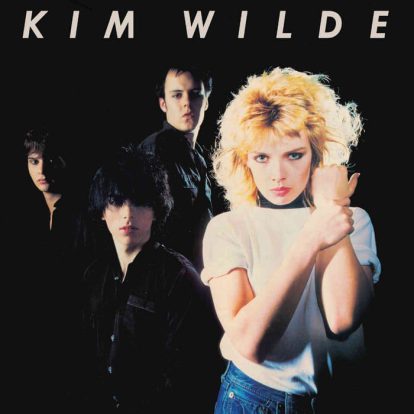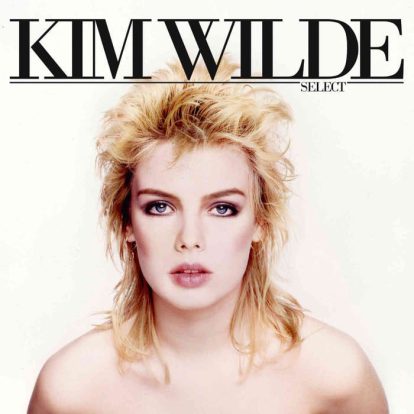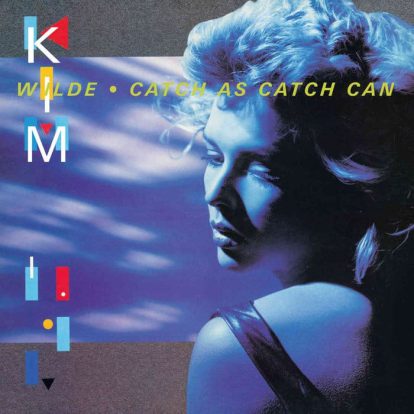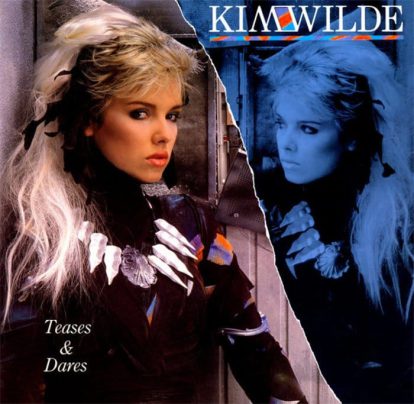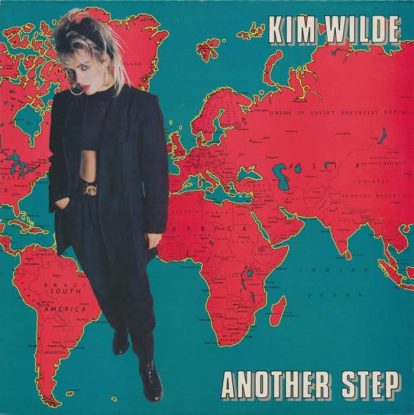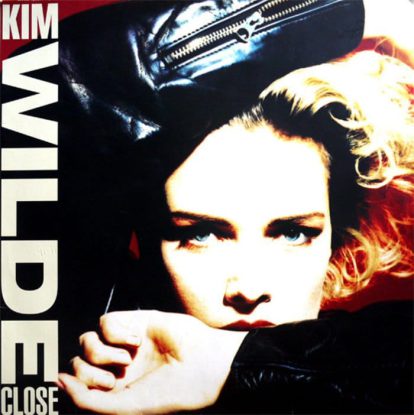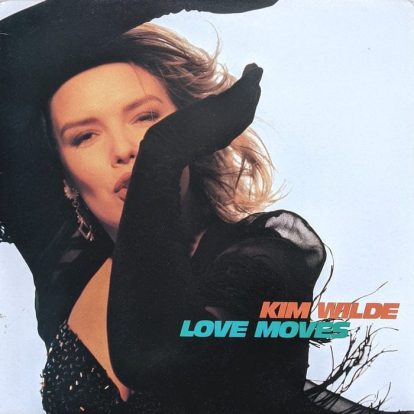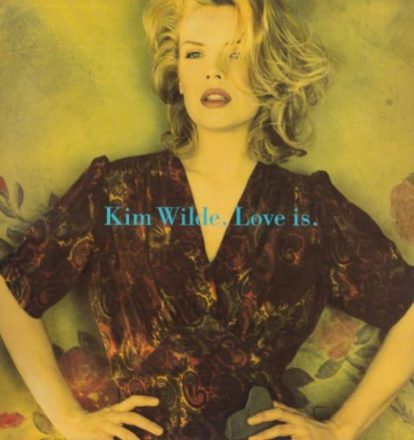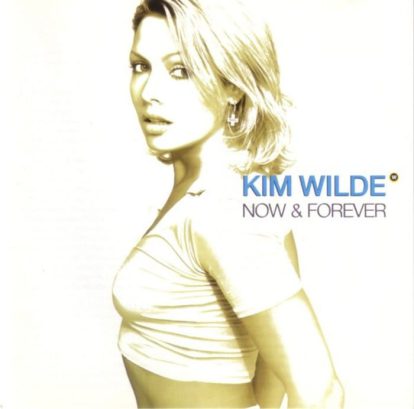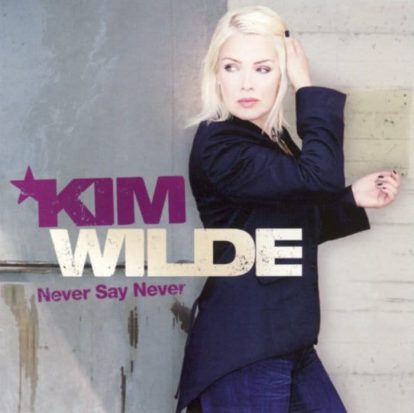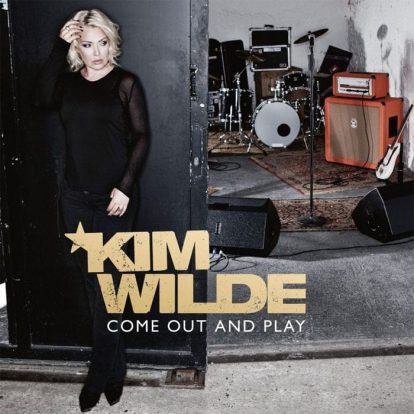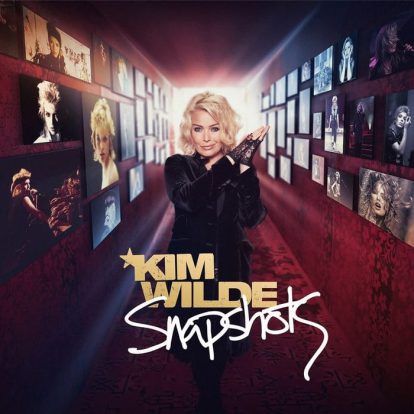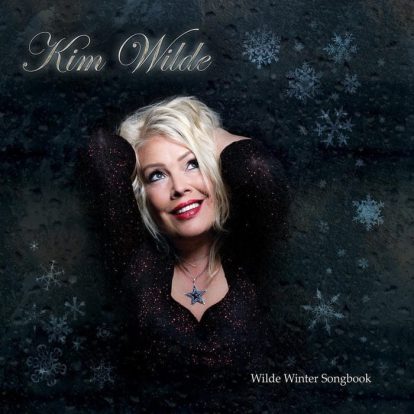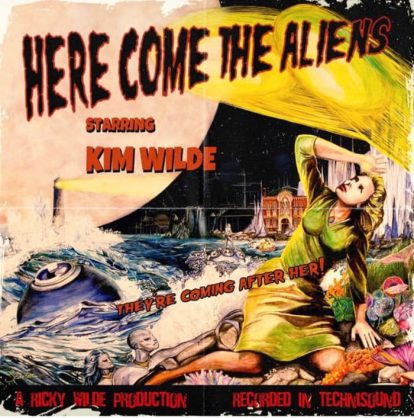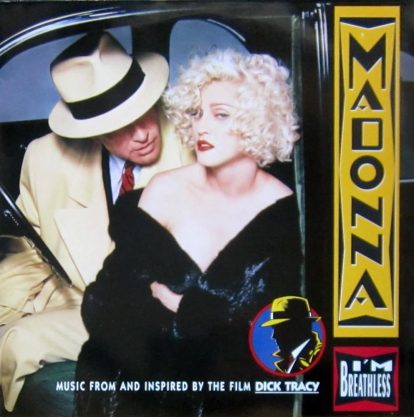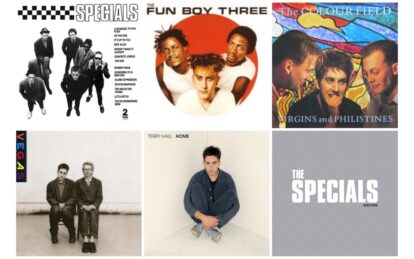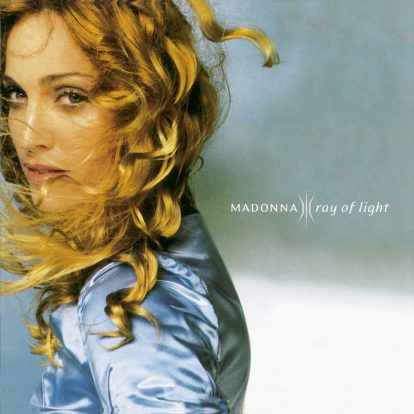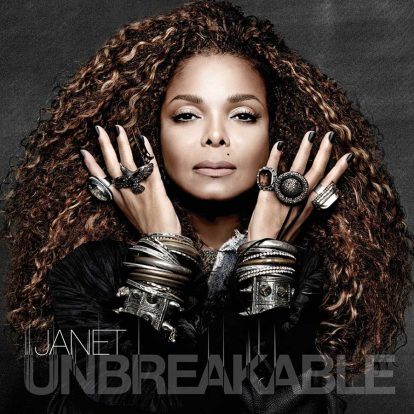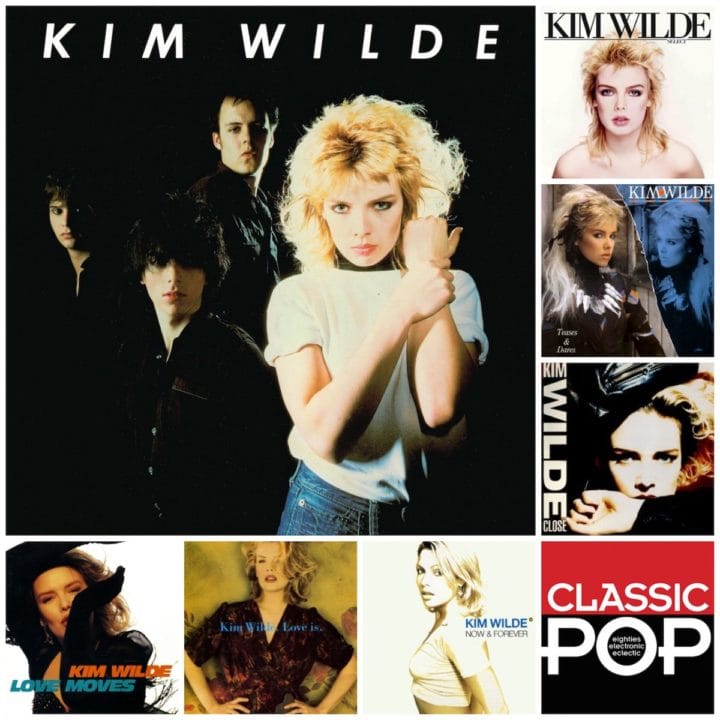
From new wave anthems to synth-driven gems and pure pop, the Middlesex-born singer boasts a wildly eclectic back catalogue. Here we present our Kim Wilde – Album By Album Guide:
KIM WILDE (1981)
Discovered by the one-man hit factory Mickie Most and guided by songwriter and 50s teen idol father Marty, Kim Wilde arrived on the music scene in 1981 with a considerable early rock and roll pedigree. But her self-titled debut album soon proved that she had little interest in being the female answer to Shakin’ Stevens.
Indeed, featuring prog rockers The Enid on backing, its forward-facing melting pot of post-punk, New Wave and synth-pop was more suited to The Blitz and CBGBs than the sock hop, with only the vintage girl group harmonies on Young Heroes throwing a nod to the past.
The assistance from younger brother Ricky Wilde, himself a brief pop idol in the early 70s, no doubt helped keep things fresh. Kim’s sibling produced the entire album, also co-writing its 10 tracks with Wilde Senior. This fruitful behind-the-scenes partnership would shape much of Kim’s early career.
This family arrangement also spawned, lyrically speaking, some of the most idiosyncratic songs of the era. Although not entirely averse to the age-old subjects of love and heartbreak, Kim Wilde tackles everything from urban decay (Our Town) to tinnitus (Water On Glass) and even prostitution (“She doesn’t have to make her money that way/ She’s such a pretty young girl,” Kim sings on the ska-inflected 2-6-5-8-0).
Everybody live for the music-go-round!
That’s not to say the star attraction, who’d only graduated from St. Albans College of Art and Design the previous year, was incidental on her own record. Blessed with a melodious and malleable voice, Kim sells the heck out of punchy opposites-attract anthem Chequered Love and closing sci-fi epic Tuning In Tuning On. But she’s equally comfortable toning things down, as on the wistful reggae of Everything We Know and melancholic guitar pop of You’ll Never Be So Wrong, as she is belting out songs as big as her bottles of hairspray.
Of course, Kim Wilde will always be defined by its behemoth of a lead single. Borrowing its nagging bassline from Gary Numan, effervescent synths from Orchestral Manoeuvres In The Dark and general allure from Blondie, Kids In America brings together all the best that early-80s pop had to offer in three-and-a-half glorious minutes. Forget Shaddap You Face blocking Ultravox’s Vienna from No.1, the biggest chart injustice of the era was such a joyous next-gen teen anthem being denied the top spot by, rather ironically, the rockabilly throwback of Shakin’ Stevens’ This Ole House.
SELECT (1982)
Kim avoided the sophomore slump, on a creative level anyway, by once again keeping things in the family. That’s not to say Select is simply a retread of what went before. Largely abandoning the punky leanings of her eponymous debut album, producer Ricky pursued a more atmospheric synth-driven sound which at times appeared to take its cues from the era’s electronic horror scores as much as his new favourite band Ultravox.
The pulsing Take Me Tonight, for example, even featured on the closing credits of Dario Argento’s giallo classic Tenebrae, albeit without the auteur’s knowledge. Chaos At The Airport, meanwhile, is an intriguing mixture of John Carpenter, Electric Light Orchestra and disaster movie, as Wilde loses her lover to some fatal plane turbulence.
The macabre theme continues on View From A Bridge, a deceptively dark New Wave banger in which a young girl commits suicide after discovering her boyfriend’s cheating ways. Then there’s the apocalyptic Action City (“The devil walks the streets/ Just as the flames of hell begin to grow”) and Top 20 standout Cambodia, a seven-minute epic which, contrary to popular belief, is not a political commentary but the tragic tale of a US Air Force pilot missing in action. Ricky and Marty appeared to be dealing with some stuff…
She won’t see his face again…
Opener Ego, a feisty kiss-off to an ex with clear commitment issues (“Your only plan it seems is look after number one/ You just can’t comprehend what it means to love someone”) whose driving rock chorus is the closest Select gets to Kim’s debut, is a little more in keeping with the mindset of an early 20-something. Likewise, the contrasting come-on of Can You Come Over, another perky throwback to the era when her father was gracing the charts.
Unfortunately, the kids in America didn’t get the chance to hear this unusual mix of young melodrama and harrowing stories of loss, pain and cataclysm. Her label, RAK Records decided against releasing the album across the other side of the Atlantic. Select fared much better back in the UK, however, and throughout Europe, topping the charts in both Finland and the Netherlands to firmly establish Kim Wilde as pop’s new ultimate ice queen.
CATCH AS CATCH CAN (1983)
1983’s third album Catch As Catch Can is notable for being the first of Kim’s studio LPs to feature a song written outside the Wilde family, with the bubbling synth-pop of Dancing In The Dark (sadly not a Bruce Springsteen cover) appearing courtesy of 70s hitmaker Nicky Chinn (Suzi Quatro, Smokie) and hard rock journeyman Paul Gurvitz.
Unfortunately, this outside interference sparked a crisis of confidence when the track limped in at a lowly No.67 in the UK charts (“Every Monday I woke up in fear and asked my record company if the record had made the charts yet,” Wilde later admitted). Its parent album fared even worse, peaking no higher than No.90 in the UK and once again failing to get a release in the States.
Love Blonde, the misleading lead single which suggested that Kim had suddenly reinvented herself as a swing-jazz songstress, didn’t exactly help matters either, landing at UK No.23. But while no lost classic, Catch As Catch Can still contains a few gems, most notably longing synth ballad Stay Awhile and the sci-fi atmospherics of Dream Sequence. Meanwhile, House Of Salome, the opening up-tempo tribute to a Herodian princess, proved once again that Kim could draw great pop from the most peculiar of subject matter.
TEASES & DARES (1984)
Kim may well have had second thoughts about leaving RAK for MCA following her new label’s insistence she reinvent herself as a wild-haired Barbarella for her fourth album’s cover art: alongside the likes of Roy Hattersley, ready meals and the 1986 buddy action cop comedy Running Scared, the star later put the outfit she sported into the BBC’s Room 101.
It’s not clear exactly what the correlation is between the space adventurer and Teases & Dares. While Kim’s previous efforts had moments of sci-fi inspiration, her 1984 LP is a relatively slick and straightforward synth-pop affair free of any extra-terrestrial bleeps. Even the track Bladerunner sounds more suited to a dreamy rom-com than the same-named Ridley Scott classic.
Slick Synth-Pop
At times, Teases & Dares is the sound of the Wilde family going through the motions. Rage To Love is another out-of-place detour into old-school rockabilly which suggests Marty, now also joining Ricky and Kim on production duties, was determined to vicariously relive his youth. Although it returned Kim to the US Top 40, (where it was renamed Go For It), there’s something slightly icky about a pop star delivering various chat-up lines (“You need some magic, come on let me lean on you”) when they’re co-written by their dad. And despite being one of two entirely self-penned affairs, even Kim seems bored on the lacklustre mid-tempo Fit In.
Her songwriting skills are much more effective on Shangri-La, an eerie tale of a faltering marriage which recaptures the melodrama of the near-named 60s girl group (“Is our time up and on to the next fire/ Got my fingers burnt and cut into the wire”) and closing make-up tale Thought It Was Goodbye. Opener The Touch and the Heaven 17-esque Is It Over are also worthy of gracing a Best Of.
As arguably the most disappointing album of her 80s days, Teases & Dares didn’t exactly hint at the transatlantic chart success that was just around the corner.
ANOTHER STEP (1986)
Having struggled to get arrested in the States since Kids In America, Kim suddenly found herself at the top of the Billboard Hot 100 thanks to an oh-so-80s rendition of a Motown classic. Buoyed by a video which pushed her wind machine resistance to its limits, her Hi-NRG rendition of The Supremes’ You Keep Me Hangin’ On saw the star join Petula Clark, Lulu, Sheena Easton and Bonnie Tyler in the exclusive club of UK solo females to have bagged a US No.1. And its parent album remains her only Top 40 entry on the Billboard chart.
Back home, Kim’s cover came agonisingly close to pole position, too, with Berlin’s Top Gun theme the party pooper this time around. However, despite its success and an eponymous Top 10 duet with soulman Junior Giscombe, Another Step failed to peak higher than No.73 on home soil.
Produced with the help of some rare outside interference – including Landscape’s Richard James Burgess and Michael Jackson hitmaker Rod Temperton – the record isn’t short of big pop hooks either: see Say You Really Want Me, Kim’s contribution to the Running Scared OST whose raunchy promo was allegedly banned by Timmy Mallett, and the Pat Benatar-esque I’ve Got So Much Love. But the mellower moments – the Sade-ish She Hasn’t Got Time For You and impassioned Brothers – were the most interesting musical steps forward.
CLOSE (1988)
Not for the first time, Kim managed to claw her way back up the slide heading toward the pop dumper. And the singer’s persistence paid off better than ever before when sixth LP Close became both a critical and commercial tour-de-force. In fact, by spawning a total of five Top 40 singles, including three Top 10 entries on the bounce, this pure pop affair positioned Wilde as the UK’s most charted female artist of the decade.
Its success was no doubt all the sweeter for the fact that Kim co-wrote seven of the LP’s tracks, perhaps in preparation for father Marty’s departure from the family business soon after. That included the song Stone, the first of several environmental protest anthems, which foreshadowed her future interest in greenery (“They’re still building and testing/ But what can we do/ Condemning the seas/ And the land and the trees to a tomb”), the opening funky kiss-off Hey Mister Heartache (which relegated former duet partner Junior Giscombe to a backing vocalist) and the sensual Love In The Natural Way, the latter boasting one of Kim’s finest vocal performances.
You came and turned my life around…
Chiswick’s finest also had a hand in the album’s two bona fide classics. Never Trust A Stranger, released in the wake of her prestigious support slot on the British leg of Michael Jackson’s Bad world tour, sounds like Blondie’s Atomic remixed for the Hi-NRG crowd. Meanwhile, You Came, the UK No.3 hit whose declaration of love is aimed not at a partner but at Ricky’s first child Marty, took the uplifting dance-pop of Kylie Minogue’s early recordings and gave it a more mature, older sister sheen.
Instead of the Stock Aitken Waterman hit factory, though, production duties were instead handed to Tony Swain, who alongside Steve Jolley had steered career highpoints for the likes of Spandau Ballet, Bananarama and Imagination. As much as Kim does the melancholic acoustic ballad justice, the relatively faithful cover version of Todd Rundgren’s little-known album track Lucky Guy still seems like a puzzling way to conclude a concerted attempt to court the Smash Hits crowd. Nonetheless, it’s easy to see why Close, which also proved to be Kim’s last hurrah on the Billboard charts, deservedly became her biggest-selling studio album.
LOVE MOVES (1990)
Kim unfortunately followed up her commercial zenith with an album that failed to spawn even one UK Top 40 hit, a first for a singer who had always been regarded as a singles artist. Luckily, the star herself appeared to take the underwhelming response in her stride (“It didn’t really come as too much of a big surprise, because my career before then had always been very up and down” she later remarked). But it must have stung just a little considering how seventh album Love Moves was clearly designed to prove that the singer, now fast approaching her 30s, could grow with her audience.
Storm In Our Hearts, for example, is a fine stab at adult contemporary, boasting the kind of piano-led middle-eight that Bruce Hornsby would be proud to call his own. In Hollywood is a slick piece of blue-eyed soul, which takes aim at the ridiculous world of showbiz (“Divorce, law courts/ Lawyers in their new sports car/ Lots of money spent/ The public making judgement”). And Top Of The Pops peer Jaki Graham and Wham! bassist Deon Estus lend a touch of class to the strings-soaked closer I Can’t Say Goodbye.
Touch Of Class
Love Moves, which itself only just managed to scrape into the UK Top 40, doesn’t quite reach the same heights when it aims for the sounds de jour. The half-hearted New Jack Swing of Love (Send Him Back To Me), one of four songs from Close collaborator Tony Swain, is more Paula Abdul B-side than dancefloor gold. And while the environmental messaging of World In Perfect Harmony has its heart in the right place, its approach is a little after-school special (“Let’s think of the good things instead of all the bad/ We mustn’t give into a world that’s going mad.”) A proto-Greta Thunberg Kim was not.
Nevertheless, the album’s highlight, the Belinda Carlisle-esque Can’t Get Enough (Of Your Love), appeared to lay the groundwork for the latest career revival ahead. Just like love, an 80s pop star’s chart fortunes can also move in mysterious ways.
LOVE IS (1992)
Having channelled Belinda Carlisle on predecessor Love Moves, Kim then teamed up with the songwriter, producer and multi-instrumentalist who guided the former Go-Go to No.1 solo success, on follow-up album Love Is. Rick Nowels contributes to three tracks here, and there are no prizes for guessing which.
Lead single Love Is Holy, which continued Kim’s yo-yo chart trajectory by becoming her first UK Top 20 hit in four years, and A Miracle’s Coming both ape the arena-sized pop-rock of Heaven Is A Place On Earth. While you can almost smell the 80s hairspray on the AOR balladry of I Won’t Change The Way That I Feel.
That’s not the only time Love Is, which featured West End star and future Eurovision Song Contest entrant Frances Ruffelle, Huey Lewis And The News’ John Pierce and Japan’s Mick Karn, suggests Kim was having trouble letting go of the decade in which she shot to fame. The chorus of Who Do You Think You Are? is a dead ringer for that of Alice Cooper’s unlikely 1989 comeback hit Poison, while Million Miles Away sounds like Actually-era Pet Shop Boys putting their own spin on the Chariots Of Fire theme. The BBC’s coverage of the 1992 Olympics in Barcelona no doubt missed a trick.
Polished Pop-Rock
As polished and hook-laden as the album’s 11 tracks are, Wilde now sounded, perhaps for the very first time in her career, behind, rather than ahead of – or at least on a par with – the curve.
The subject matter is similarly unimaginative, too. Gone are the days of songs about hearing disorders, aircraft disasters and Herod the Great’s granddaughter. And in their place was a series of romantic sentiments that bordered on the trite (see “You take me higher than I thought I could go/ Can’t hide it any longer, I need you to know” on Touched By Your Magic).
The following year’s greatest hits compilation The Singles Collection 1981–1993, which added a breezy cover of Yvonne Elliman’s 1977 Saturday Night Fever cut If I Can’t Have You to her tally of hits, landing just outside the Top 10, proved that Kim Wilde wasn’t ready for the horticultural life just yet. But there’s a sense here, ironically given the album’s title, that her heart wasn’t really in it.
NOW & FOREVER (1995)
Co-produced by C.J. Mackintosh, best-known as a member of Pump Up The Volume chart-toppers M/A/R/R/S, and fellow DJs-turned-hitmakers Serious Rope (Michelle Gayle, Kenny Thomas), Now & Forever found Wilde finally moving into the 90s, albeit with what would also become her last album in 11 years.
Her ninth LP was also her first not to chart in the UK, an undeserved state of affairs but perhaps indicative of how Wilde was still a little behind the times.
Co-written by Dead Or Alive’s Tim Lever and Michael David Percy, lead single Breakin’ Away is the kind of muted house pop that Dina Carroll had made her name with a few years previously. Likewise, the equally summery but equally dated club-lite efforts Sweet Inspiration and Heaven.
But it wasn’t just the dance scene that Now & Forever took some belated inspiration from. There’s a strong R&B flavour here, too, from Life & Soul, a sultry little number reminiscent of Janet Jackson’s That’s The Way Love Goes, to the sunny Eternal-esque harmonies of High On You and slick slow jam of Hypnotise. C’Mon Love Me, meanwhile, could be mistaken for the acid-jazz of The Brand New Heavies.
Blithe Spirit
Not all of Now & Forever’s accidental pastiches work. There are a few too many treacly ballads, for one thing, with You’re All I Wanna Do (“And it doesn’t really matter where I am/ ‘Cause there’s nothing I would rather see than your face smiling back at me”), in particular, leaving you glad that Kim rarely strayed into Mariah and Whitney territory. But she’s arguably never sounded more carefree.
On this occasion, however, the tumbleweed reaction caused Kim to have a major rethink, with the star later telling the Sunday Post: “No one was terribly interested in me veering from the road I’d trodden up to that point. I thought, ‘I’ve probably outgrown all of this.’” Appearances in the revival of The Who musical Tommy and the Here And Now 80s nostalgia-festivals ensured that she didn’t entirely abandon her first career path. But for the next decade or so, Kim seemed more interested in giving Charlie Dimmock a run for her money than extending her musical legacy.
NEVER SAY NEVER (2006)
Having dipped her toes back into pop waters on a European Top 10 duet with fellow 80s survivors Nena in 2003, Kim unexpectedly decided to launch a proper comeback with her aptly-titled 10th studio effort. Also co-produced by the German band’s Uwe Fahrenkrog-Petersen, Never Say Never is a curious affair designed to remind audiences of her former glories while also trying to convince that there are more to come.
As always when an artist tries to rewrite history, the results are mixed. You Came loses its lightness of touch thanks to an overload of guitars, while Cambodia is rendered unrecognisable by Paul Oakenfold’s generic trance remix. But the shimmering techno of View From A Bridge could have easily fitted onto Madonna’s Ray Of Light, while former Ash guitarist Charlotte Hatherley, whose solo debut opened with a tribute to Wilde, helps to give Kids In America a punkier makeover.
On the new material, Kim seemed keen to prove what she’d been listening to during her 11-year break, from the French Touch-inflected Forgive Me and Evanescence-esque drama of Lost Without You to Together We Belong, whose melodies heavily borrow from Portishead’s classic Sour Times. It was good to have her back, but Never Say Never suggests she wasn’t exactly sure where she should be heading.
COME OUT AND PLAY (2010)
Wilde appeared far more purposeful as she celebrated her fourth decade as a pop star, with the majority of 11th LP Come Out And Play bridging the narrow gap between the New Wave she’d found fame with and the feisty pop/rock of P!nk and Kelly Clarkson. Get Out and King Of The World are particularly infectious examples, while Lights Down Low remains her strongest lead single since You Keep Me Hangin’ On.
Kim’s first record since signing with Columbia SevenOne was also her first with no Ricky production credit: perhaps explaining the album’s cohesiveness, relative unknown German producer Henrik Guemoes took full control. But the younger Wilde sibling did still co-write four tracks including Greatest Journey, a duet with Heaven 17’s Glenn Gregory, the rowdy stomper This Paranoia and the fast and furious My Wish Is Your Command, the latter adding Kim’s niece Scarlett Wilde to the list of family collaborators.
The short but sweet piano shuffle of closer Jessica proved Kim can craft a winning tune entirely on
her own. However, the twanging bassline on Hey You! is so remarkably similar to Depeche Mode’s Personal Jesus’, one can only assume Martin Gore doesn’t believe in lawsuits. Occasional near-plagiarism aside, though, this self-described labour of love is as inviting as its title.
SNAPSHOTS (2011)
No stranger to other artists’ material, having previously tackled The Supremes, Yvonne Elliman and Brenda Lee, Wilde would add everyone from Britpop progenitors Suede (Beautiful Ones) to Kirsty MacColl’s (They Don’t Know) to her rollcall on her 12th LP. The covers album is usually the sign of an artist short on inspiration, but its impressively wide breadth of material – tracks span from Dionne Warwick’s (or Cilla Black’s) 1963 hit Anyone Who Had A Heart to Sugababes’ 2007 chart-topper About You Now – means that Snapshots is far from the lazy cash-in perhaps anticipated.
There’s still moments, though, where it sounds like Wilde has simply been let loose in a karaoke booth (see the renditions of Tasmin Archer’s Sleeping Satellite and Black’s Wonderful Life).
But for the most part, Kim tries to put her own distinct spin on things, whether the U2-esque treatment of Erasure’s A Little Respect, Diana Ross’ Motown classic Remember Me repurposed as a Eurodance floorfiller or the shimmering makeover of Mike Oldfield’s To France. Inessential, yes, but intriguing nonetheless.
WILDE WINTER SONGBOOK (2013)
Just like covers album Snapshots, Kim largely swerved the standards for her festive debut. In fact, there’s just as many self-penned compositions as there are Christmas classics, with several (One, Hope, New Life) the type of pensive piano ballads you can imagine soundtracking a John Lewis ad weepie.
Fleet Foxes’ White Winter Hymnal, here lent a poignancy as the first duet between Kim and father Marty, and a near-a cappella take of Sara Bareilles/Ingrid Michaelson’s gorgeous Winter Song are hardly obvious choices either. Even Silent Night is given a new verse co-penned with now-ex-husband Hal Fowler, while instead of Mel Smith, she gets Rockin’ Around The Christmas Tree with fellow Here And Now regular Nik Kershaw: could that viral clip of a merry Kim belting it out on the Tube have inspired the whole project?
Those who prefer the classics should enjoy the Rick Astley-featuring Winter Wonderland, a glass of mulled wine in musical form, and the jazz-tinged Have Yourself A Merry Little Christmas. Add this to Tracey Thorn’s Tinsel And Lights on the rather niche list of latter-day seasonal LPs by 80s female pop stars.
HERE COME THE ALIENS (2018)
Whether you believe Kim’s tale of seeing a UFO in her Hertfordshire back garden or not, it still inspired her first UK album chart entry in 26 years, a return to the RAK Studios where it all began and unarguably the most striking album cover of her career.
A throwback to the Ed Wood-esque B-movies of the 1950s, Here Come The Aliens’ sleeve artwork was designed by niece Scarlett, with songwriting contributions from younger sister Roxanne – herself a pop star in short-lived noughties band Dimestars – further extending the family connections.
Produced solely by Ricky, too, Kim’s 14th studio effort initially sticks to the extra-terrestrial theme, with the electro-glam of opener 1969 hinting that aliens may, in fact, be our saviour when the apocalypse comes. The gorgeously dreamy closer Rosetta, meanwhile, finds Kim pondering the purpose of mankind (“Tell us from where we’ve come and who we are/ Are we the dust of a distant star?”) alongside the pixie-like tones of Swedish songstress Frida Sundemo.
Close Encounters
But the overall concept soon makes way for other concerning issues: online trolling on the ominous Cyber.Nation.War (“Your cowardly malicious lies/ Cause only devastation to everybody’s lives”), for example, or the tragic teenage pact that adds Solstice to Kim’s slightly alarming catalogue of suicide anthems. While the subject matter often screams danger, Here Come The Aliens’ sound is largely of a perkier nature. Following a Video Killed The Radio Star-esque intro, Pop Don’t Stop evolves into the type of skirt-ripping bubblegum tune that would once have killed at Eurovision. New Wave throwback Birthday is every bit as celebratory as its title indicates, while there are echoes of Daft Punk’s joyous Get Lucky in the fretless bass disco of Yours ‘Til The End.
Let’s hope that talk of a 15th album comes to fruition – new duets with Boy George and Tom Aspaul on 2021’s exhaustive hits collection suggest Kim still has plenty of pop gems left in her. It will certainly be worth the wait if it’s even half as strong as this second chapter peak.
For the latest on Kim click here
Want to read more? Check out our Kim Wilde Interview from 2021
Classic Pop may earn commission from the links on this page, but we only feature products we think you will enjoy.

